Brain Cancer Risk Factors: Understanding What Might Increase Your Risk
Understanding the brain cancer risk factors is a key area of research in the ongoing fight against this disease.
While it’s important to remember that many people with these risk factors never develop brain cancer, and many people who do develop it have no identifiable risk factors, being aware of potential associations can empower us to make informed decisions about our health and understand potential vulnerabilities.
This article will break down the known brain cancer risk factors in simple terms, focusing on what might increases the risk of developing these tumors.
It’s crucial to emphasize that brain cancer is not contagious, and in most cases, the exact cause of a primary brain tumor remains unknown. Researchers continue to study various genetic, environmental, and lifestyle factors to better understand why some individuals develop these tumors while others do not. This article will explore the most well-established brain tumors risk factors.
Gain a foundational understanding of brain cancer
What are Risk Factors?
In medical terms, a risk factor is anything that increases the risk of developing a particular disease, such as brain cancer. Having one or more risk factors doesn’t guarantee that a person will develop the disease, and conversely, not having any known risk factors doesn’t mean a person is immune. Risk factors simply indicate a statistical association observed in population studies.
Established Brain Cancer Risk Factors
While the causes of most primary brain tumors are not fully understood, several brain tumors risk factors have been identified through research:
Age
Age is one of the most significant risk factors for brain cancer overall. While brain tumors can occur at any age, the likelihood of developing many types of brain cancer increases the risk as people get older. However, certain types of brain cancer, such as medulloblastoma, are more common in children. The incidence of high-grade gliomas, a type of aggressive primary brain tumors, also rises with age, particularly after age 60.
Radiation Exposure
Exposure to high levels of ionizing radiation is a well-established brain cancer risk factor. This type of radiation, used in radiation therapy to treat other cancers, has been linked to an increased risk of developing brain and spinal cord tumors years later. The risk is generally higher with higher doses of radiation to the head. This is a critical consideration for survivors of childhood cancers or individuals who have received cranial irradiation for other medical conditions.
Family History and Genetic Syndromes
While most brain tumors are not hereditary, a small percentage of cases are associated with inherited genetic syndromes. Certain rare genetic conditions significantly increases the risk of developing brain tumors risk factors:
- Neurofibromatosis Type 1 (NF1) and Type 2 (NF2): These conditions are linked to the development of various tumors, including optic gliomas and acoustic neuromas (tumors of the nerve connecting the ear to the brain).
- Tuberous Sclerosis: This rare genetic disorder can cause non-cancerous tumors to grow in the brain and other organs, and it increases the risk of certain primary brain tumors, such as subependymal giant cell astrocytomas (SEGAs).
- Von Hippel-Lindau Disease (VHL): This inherited condition is associated with an increased risk of developing hemangioblastomas, blood vessel tumors in the brain, spinal cord, and retina.
- Li-Fraumeni Syndrome: This rare inherited disorder is caused by mutations in the TP53 gene and increases the risk of various cancers, including certain primary brain tumors.
- Other rare syndromes like Gorlin syndrome, Cowden syndrome, and Turcot syndrome have also been linked to a slightly higher risks of certain brain tumors.
Having a family history of brain cancer without a known genetic syndrome has a less clear association, but some studies suggest a slightly higher risks in individuals with a close relative who has been diagnosed.
Exposure to Certain Chemicals
Research into the link between environmental exposures and brain cancer is ongoing. Some studies have suggested a possible association between exposure to certain chemicals, such as vinyl chloride (used in the plastics industry) and high levels of pesticides, and an increased brain tumor risk.
However, more robust research is needed to confirm these links definitively. Currently, no strong environmental or occupational links, outside of ionizing radiation, are consistently proven brain cancer risk factors.
Previous Cancer History
Individuals who have had certain other types of cancer may have a slightly higher risks of developing secondary brain tumors, where the cancer spread to the brain from the original site.
As mentioned earlier, common cancers that can spread to the brain include lung cancer, breast cancer, melanoma, colon cancer, and kidney cancer. The risk depends on the type and stage of the primary cancer.
Weakened Immune System (Immunosuppression)
People with a weakened immune system are at a slightly higher risks of developing certain types of brain cancer, particularly primary central nervous system lymphoma (PCNSL).
This can include individuals with HIV/AIDS, organ transplant recipients taking immunosuppressant drugs, and those with inherited weakened immune system disorders.
The immune system normally plays a role in identifying and destroying abnormal cancer cells, so a compromised immune system may be less effective at this task.
Identify symptoms that may indicate brain cancer
Factors Not Strongly Linked to Brain Cancer Risk
It’s also important to address factors that have been investigated but have not been consistently linked to an increased risk of brain cancer:
- Cell Phone Use: Numerous studies have investigated a potential link between cell phone use and brain cancer, but the overwhelming scientific consensus is that there is no clear evidence of an increased risk.
- Power Lines: Similarly, extensive research has not found a consistent link between living near power lines and an increased risk of brain cancer.
- Artificial Sweeteners: Scientific evidence does not support a link between artificial sweeteners and an increased risk of brain cancer.
- Diet: While a healthy diet is important for overall health, there is no strong evidence linking specific dietary factors to an increased risk of brain cancer.
Understanding Risk in Context
It’s crucial to understand the concept of risk in the context of brain cancer. Even for established brain cancer risk factors like high-dose radiation therapy or certain genetic syndromes, the absolute risk of developing a brain tumor remains relatively low.
For example, while survivors of childhood leukemia treated with cranial radiation therapy have a higher risk than the general population, the majority will not develop a secondary brain tumor.
Furthermore, many people who are diagnosed with a brain tumor have no known brain cancer risk factors. This highlights the fact that the development of this disease is often complex and involves factors we don’t yet fully understand.
The Darren Daulton Foundation is dedicated to providing crucial financial assistance and support to individuals and families facing the challenges of a brain cancer diagnosis, particularly those with primary brain tumors. Please consider supporting our mission:
Support our mission to assist those affected by brain cancer
If you or someone you know is currently battling a brain tumor and needs financial support, we encourage you to learn more about our assistance program:
Learn about available financial support for brain cancer treatment
While the exact causes of most primary brain tumors remain unknown, research has identified several brain cancer risk factors that may increases the risk.
These include older age, exposure to high levels of ionizing radiation, a family history of certain genetic syndromes like li fraumeni syndrome, tuberous sclerosis, and von hippel lindau disease, a history of certain other cancers that can spread to the brain, and a weakened immune system
It’s important to remember that having these brain tumors risk factors does not mean a person will develop brain cancer, and many individuals diagnosed with the disease have no identifiable risks.
Continued research is essential to better understand the complex interplay of factors that contribute to the development of brain and spinal cord tumors and to ultimately find ways to prevent and treat this challenging group of diseases.
Disclaimer: The information provided here by the Darren Daulton Brain Cancer Foundation is for educational purposes and general guidance only. It is not a substitute for professional medical advice. Always seek the advice of your physician or other qualified health provider.



